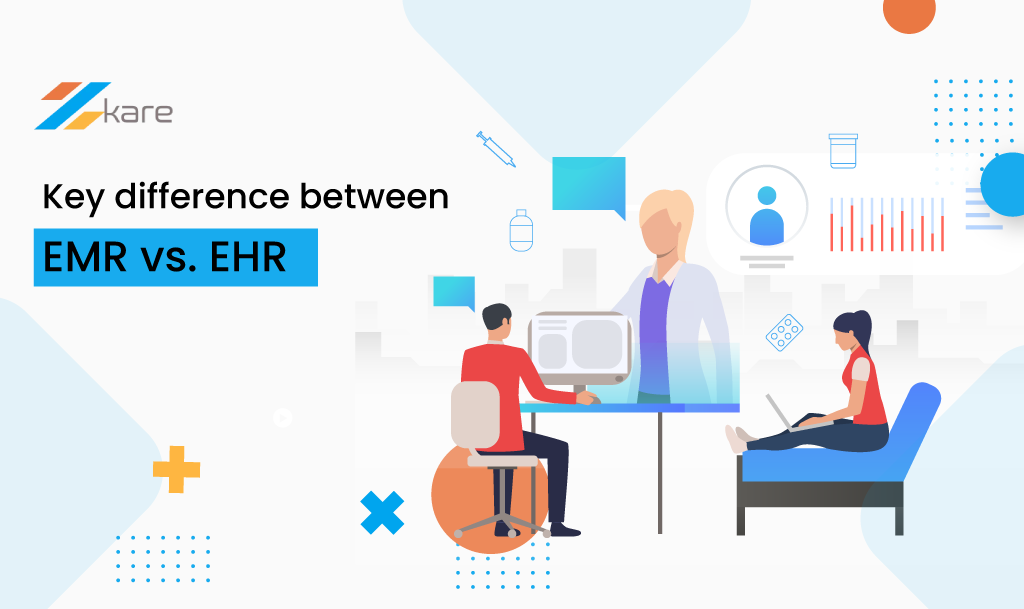
EHR Systems, EMR Systems
In recent years, hospitals, doctor’s offices, clinics, and nursing homes in the United States switched from paper to digital record keeping. The technology, software, and training required to accomplish the transition were funded with billions of dollars by the federal government and health organizations.
The phrases “EMR” and “EHR” are frequently used in the medical industry. Although these terms are usually used interchangeably, did you know that they relate to different medical software solutions? Continue reading to find out how EMRs and EHRs differ from one another and how they can be beneficial for your organization.
What is EMR software?
The term “electronic medical records,” or EMR in healthcare, refers to a digital version of the paper records that were once kept by medical providers but are now kept electronically. Such documents include medical diagnosis, prescribed medications, and treatment to track client data over time.
What is the EHR software?
EHR is similar to EMR, which is “electronic health records software.” The critical distinction between EMR and EHR is that EHR systems provide much more features. EHR systems gather health data about clients from various sources, including hospitals, doctors, labs, and the patients themselves. An approach like this enhances the way clients receive treatment.
What’s the difference between EMR and EHR?
It is simple to remember the difference between EMRs and EHRs. If you think about the terms “medical” and “health,” While an EHR provides a more thorough evaluation of the patient’s general health, an EMR, on the other hand, offers a more simplified perspective of a patient’s medical history.
Here are a few different ways EMRs and EHRs differ:
Healthcare providers generally use an EMR for treatment and diagnosis.
The EMR system is not created to be shared outside the individual practice.
EHRs are designed to share a client’s information with authorized providers and employees from different organizations.
EHRs allow patients’ medical records to move to specialists, labs, imaging centers, emergency departments, pharmacies, and even across state lines.
When should you use an EHR vs. an EMR?
Utilizing EHR software means having an interoperable solution that connects with all points of care a client might face. Using EHR solutions enhances the quality of patient care and the complete client experience; however, EMR usage can only achieve the former.
EMRs are undoubtedly an improvement over medical records and paper patient charts, but they only solve the gaps in paper records. On the other hand, EHRs enhance the complete patient experience.
The current regulations from the Centers for Medicare & Medicaid Services have encouraged healthcare providers to embrace interoperable medical software platforms, which has increased the adoption of EHRs and reduced the use of EMRs.
Benefits of EMRs and EHRs
Patient involvement.
EHRs often give patients access to their medical information, which is impossible with paper records and still quite challenging with EMRs. If the client has to take some time at home to consider their treatment options for a critical medical condition, having this access can be helpful.
Speech-to-text
While taking notes during client visits, both EHR and EMR systems provide speech-to-text functionality. This feature has several advantages, such as improved charts and simplified medical billing.
Thorough data security
Speaking of HIPAA, all of the best EHR platforms are fully HIPAA-compliant. You don’t have to be concerned about breaching a client’s privacy when providing them with complete care because their data safety and security policies meet the federal government regulations. Electronic patient data is significantly more difficult for criminals to obtain than paper records because of these data protection measures.
Stay tuned for more
Now that you know the main distinctions between an EHR and EMR and how each might help your organization. In that case, our team of experts would be happy to get in touch with you for a free demo from Zkare.